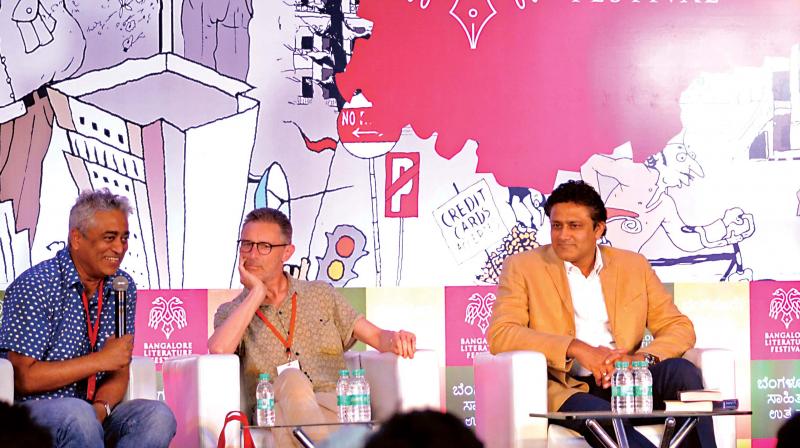Bengaluru Literature Festival: More politics than literature

Bengaluru: Historian Ramachandra Guha’s fiery tirade against the state of Indian politics, for he tore lustily into the Left and the Right, was the perfect recipe for any remnants of sleep that may have lingered among the audience early on Saturday morning.
The Bengaluru Literature Festival couldn’t have got off to a more high-octane start, although one did wonder, during the course of the day, if the schedule could have done with a little less political debate and more authors. Guha set the tone for what was to come.
His talk, as proved the case with several other panels, was preceded by a scramble for seats under the trees and away from the unrelenting sunshine. The panel, Jingoism vs Patriotism, ran into well over an hour as arguments raged on Twitter, sparked off by his enthusiastic listeners.
"Why does the Hindutva have so many supporters? Why is jingoism ascending? The first reason is the hypocrisy of the Indian left," Guha railed. The Congress party and the CPI have dominated the intellectual class, theatre and culture and film, he said. "Sadly, this is an anti-patriotic left. They have always loved some other country more than India. This is in part a provocation to the rise of jingoism" he added.
Writer Perumal Murugan, whose novel, Madhorubhagan received the ire of Hindutva and caste outfits, took a more introspective turn with his panel. Describing his mother's battle with Parkinsons and her repulsion towards a Dalit helper Murugan had hired to care for her, he turned the caste argument on its head. "It's not always bad," he said. "It is used politically but it has many benefits. It seeps into every aspect of our lives, from birth, to death, to the food we eat. It gives us a God."
Union Minister Hardeep Puri, who addressed two very well-attended panels on Saturday, described Pakistan as a "minor irritant," saying, "India needs to deal with her own problems." He took a more cautious stand on the Myanmar crisis, however, saying, "The government has taken a very mature stand. We have always helped those in need but there are other factors at work here." His afternoon session, Festering Wounds - The 1984 riots, which lived up to its provocative title, had him speak with a great deal of candour: "It is unfortunate that no political leaders were indicted or booked after 1984."
The Red Couch, tucked away in a corner of its own, flanked by the bustling bookshop, made for a refreshingly intimate setting. This is where people went for personal, interactive chats with their favourite authors - an atmosphere slightly marred by the noise of the book sales at the other end of the room. Shinie Antony, author Manu Joseph, Kannan Sundaram and Preeti Gill kept their audience in splits during Crime Pays!, a delightful little session on the nuances of writing thrillers. And Anil Kumble, former Indian cricket coach was undoubtedly one of the biggest attractions of the evening, with his session drawing a fresh surge of visitors. He even dropped in at CLF, the kids' section, to give them an impromptu talk on wildlife, much to their delight . The latter sessions brought the day to a pleasantly mellow close, a welcome break, to the politically charged atmosphere.
‘1984 Anti-sikh riots not spontaneous, but pre-planned’
Over 3,000 Sikhs were butchered on the streets of Delhi after the assassination of former Prime Minister Indira Gandhi. Minister of State (Independent Charge) for Housing and Urban Affairs Hardeep Singh Puri said that it is unfortunate that none of the political leaders has been indicted or booked in the 1984 anti-Sikh riot case. At a panel discussion titled, ‘Festering Wound – 1984 Riot’, the minister, who also served as a bureaucrat then, said that he was shocked when he heard about Operation Bluestar. “The storming of the Golden Temple was wrong. Had the government taken corrective action, the situation would not have reached such a pass,” he said.
Former IPS officer Kanwaljit Deol said that the Khalistan movement took over entire Punjab after the Army entered the temple complex to flush out the militants. She has authored a new book, The Year of the Hawks, that deals with the traumatic years of 1984 when a young man from a village in Punjab rose to being a dreaded figure (referring to Jarnail Singh Bhindranwale).
The panellists criticised former PM Rajiv Gandhi’s speech made after the assassination of Mrs Gandhi where he said, “When a big tree falls, earth shakes…” Former IAS officer and the author of a short story, When a Big Tree Falls, Mr N.S. Madhavan recalled the chilling day of October 31, 1984. “I believe that the riot was not spontaneous, but a pre-planned conspiracy. To use riots as a political tool has been repeatedly in this country,” he said.

